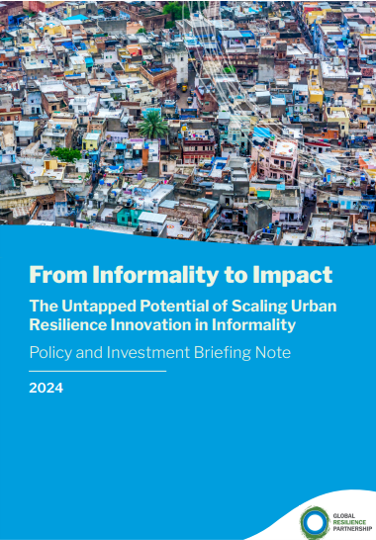From Informality to Impact – The Untapped Potential of Scaling Urban Resilience Innovation in Informality

From Informality to Impact – The Untapped Potential of Scaling Urban Resilience Innovation in Informality
Policy and Investment Briefing Note
9 November 2024
Currently only 1.2% of urban climate investments flow to climate change adaptation and resilience solutions. Increasing investment flows requires
diversifying and strengthening the solution pipeline across different models – for-profit, not-for-profit, private-sector-led and private–public partnerships, as well as nurturing an enabling environment – policy, finance, measurement and evidence building – for these solutions to scale.
To effectively tackle the climate crisis in cities, municipal and public sector finance alone cannot meet the current funding gap. However, there is little evidence and information available regarding the opportunities and challenges for the private sector and the not-for-profit sector to drive the design and implementation of urban resilience solutions, especially in informal contexts.
Vulnerability to climate risks is extremely skewed across urban populations, with informal workers, residents in informal settlements, migrants and displaced people, as well as young and elderly people, facing the triple challenge of higher exposure to climate change hazards, higher susceptibility to damages caused by climate change and a lesser financial ability to cope and recover from shocks.
This presents both a challenge and an opportunity for innovative solutions that build resilience to climate risks.
Purpose and Scope of This Report
This study reviewed ~130 urban resilience solutions implemented by for-profit and not-for-profit organisations in cities in the Global South, with a focus on informal contexts.
The research included a comprehensive literature review, in-depth qualitative interviews with funders and implementers, and a large-scale survey.
The report seeks to:
• Review the current landscape of for-profit and not-for-profit urban resilience solutions1 being implemented in informal contexts (including but not limited to informal settlements, informal economies and labour) in the Global South.
• Identify key opportunities and challenges for scaling urban resilience solutions in informal contexts.
• Provide recommendations for enabling policy and investment approaches to help scale the for-profit and not-for-profit resilience solutions market.
